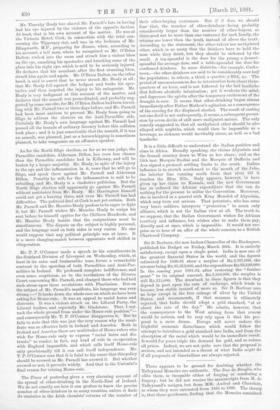Sir D. Barbour, the new Indian Chancellor of the Exchequer,.
published his Budget on Friday, March 20th. It is entirely satisfactory, except upon a single point. India is now one of the greatest financial States in the world, and the figures estimated for 1890.91 show a surplus of Rx.2,787,000, the• revenue being Rx.85,313,000, and the expenditure Rx.82,520,000.: In the coming year 1891.92, after restoring the "famine grant" to its original amount, Rx.1,500,000, the surplus is. still Rx.115,000. The drawback to these figures is that they depend in part upon the rate of exchange, which tends to- become less stable instead of more so. Sir D. Barbour sees. no hope except in the free coinage of silver by the United States, and recommends, if that measure is ultimately rejected, that India should adopt a gold standard, "at or about the rate of the day." He admits, however, that. the consequences to the West arising from that course would be serious, and he may rely upon it that his pro- posal is a mere dream. Europe will never endure the frightful economic disturbance which would follow the attempt to introduce a gold standard into India, and from the absorption of the metal which would be its immediate result. It would for years triple the demand for gold, and so reduce all prices. Indeed, we are not quite sure that the proposal is: serious, and not intended as a threat of what India might do- if all proposals of bimetallism are always rejected.


































 Previous page
Previous page